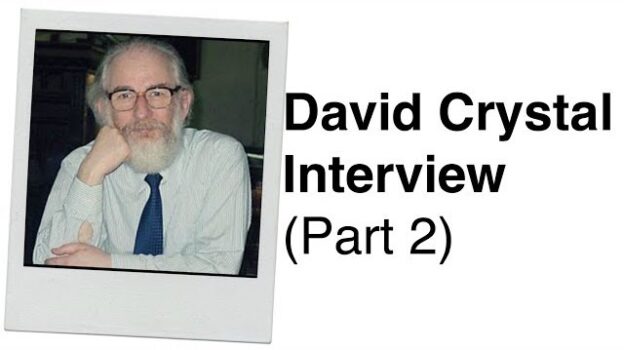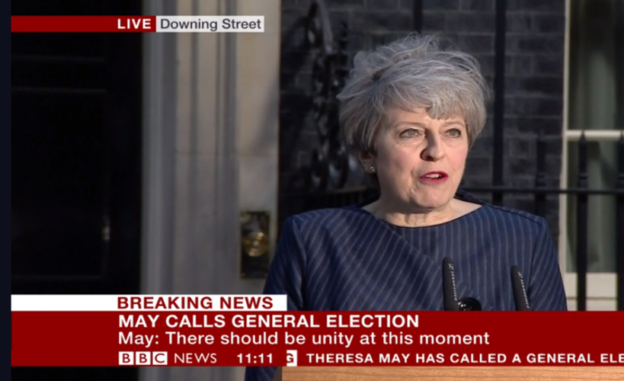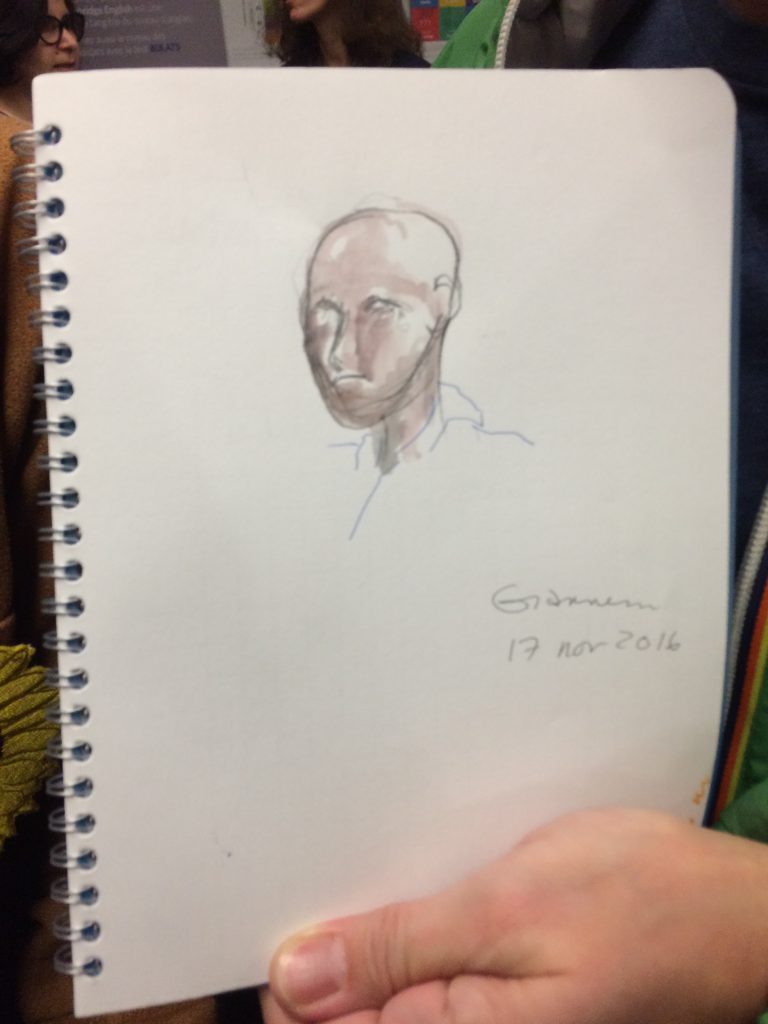Discussing and clarifying what David Crystal said in episode 454. Conclusions about language learning and linguistics.
[DOWNLOAD]
Transcript
Here we are back once again with an episode of this podcast for learners of English. This one should contain insights about the English language and the process of learning that language, straight from the horse’s mouth.
That’s an expression, “straight from the horse’s mouth” which means you get information directly from a reliable and trusted source. In this case that source (or horse) is Professor David Crystal, who of course isn’t a horse – that would be very bizarre. No, he’s of course, he’s not a horse, he’s a great expert on the English language, the author of many books, known by anyone studying linguistics, he’s described as the world’s leading voice on language. I was very happy to have that leading voice on my podcast and there’s certainly a lot of good information to take in – whether you’re learning English or simply interested in languages and what makes them tick.
In this episode the plan is to go through some of the ideas David talked about and see if I can point out some specific bits of relevance for learners of English.
Let’s unpick the wise words of Prof David Crystal and really clarify some truths, tips and general conclusions about language learning, and perhaps explain some of the vocabulary you heard as well.
Essentially, I am going to repeat the main points DC made here, but the aim is to clarify it all and make it a bit more digestible. I will constantly be attempting to answer the question – how is this useful for learners of English? So, you should be able to take away quite a lot from this episode, in combination with the other two.
Is grammar glamorous?
Glamour and grammar come from the same word – because grammar, language etc used to be considered like magic. But grammar seems to have lost its magic these days, in the way people think about it. These days its considered to be boring, prescriptive and all about rules you learned at school.
It’s not glamorous if you study it like they used to in school. Just parsing sentences and working out what the part of speech is.
It only works if you ask why people are using those forms.
Semantic (focusing on meaning) vs pragmatic (why people say the things they say).
Understanding the motivations of the people who use grammar (the pragmatic side) is the interesting part and that’s when grammar really comes alive and becomes glamorous in the old sense of the word.
For learners of English this means exploring not just the form of the language you’re studying but also the reasons why each different form is used. The challenge is to get the semantic side and the pragmatic side into your studies.
So, don’t just study grammar rules on their own in a list. You need to examine the living language and notice those forms and the way they are used to perform specific functions.
Can you learn English without studying grammar?
Children do it, and you can do it too but it takes a long time for all the language to be assimilated by exposure. You can cut out a lot of that time by studying the rules. As adults we can apply what we already know and take apart the language by studying. So, studying grammar is an essential part of the learning process and goes together with a more long-term process of acquiring English through exposure.
But it’s no good just learning the rules and being able to explain it all on paper, you have to know when and why and where all the grammar is used. So it’s about applying yourself to the pragmatic aspects of the language you’re using and letting that guide your choice of language.
So, as I’ve said before – listen a lot, read a lot – like this podcast or any other material you fancy, but it’s best enjoyed as part of a balanced diet. Do some grammar work too, like self-study exercises in English Grammar in Use or another decent workbook, but make sure you are always asking yourself – why are these people using this language like this? How are the motivations affecting the choice of words and structures? When you’re doing your listening try to notice bits of language which you’ve studied. Could you say the same thing another way? What would be the difference and how is language related to that. Try experimenting with different ways to put something and get used to the slight nuance it adds. E.g. using a passive structure or an active one.
I know you’re not actually an English teacher, but do you have any tips for learners of English who want to improve their grammar?
No! Not a teacher!
Some linguistic-y tips – basically to know what all the grammar is, but also to be aware of the English that’s being used in the real world and how all that applies to the grammar you’ve studied.
I would add:
don’t be afraid of it, it’s more interesting than you might think, you might need to learn some abstract terms but don’t be put off, the more you learn the more you can learn, always look for examples.
Learning about why certain grammar forms are used really opens up the way you can see language. For example, learning that passive forms are used when you don’t want to mention who did the action allows you to see all those situations. You might want to write an impersonal formal letter, or give a general notice, or describe a process or simply talk about something that happened to someone without constantly talking about who did it. E.g. imagine a story about a guy who is a victim. People keep doing things to him but you want the guy to be the centre of the story. Like, John was kidnapped. He was bound and gagged and thrown into the back of a taxi. It took two hours for him to be rescued.
You wrote a political history of grammar in the UK (published online at http://www.davidcrystal.com)
What relationship does the average Brit have with grammar today?
Essentially, Brits have an up and down relationship with grammar, based on the fact that grammar study came in and out of fashion and grammar was learned in a two-dimensional way. People are often a bit prescriptive about grammar as they think it should be about rules and regulations, but they’re really only attempting to impose controls over something which evolves over time.
Knowledge of Grammar in the UK
In the 50s kids all learned basic grammar at school, getting examined at 16. Told to identify parts of speech in a sentence.
Then it went out of fashion in the 70s.
Several generations of kids who didn’t study any grammar at all.
Now they’ve grown up and some of them are teachers.
They don’t know any grammar.
The ones who grew up in the old style had learned grammar.
The younger ones were teaching but had no knowledge of grammar.
“The baby had been thrown out with the bathwater”
A language awareness programme was brought back, with a modicum of grammar back in the syllabus/curriculum.
David had to do lots of basic grammar training for these teachers. He wrote “Rediscover Grammar”.
Now, it’s back again.
Kids are examined for their ability to recognise parts of speech and do sentence parsing.
But the semantics and pragmatics aren’t there – it’s just mechanical analysis of sentences. Some teachers are very unhappy.
Now there are 3 types of audience.
The oldies who are in their 60s who know about the old style grammar teaching,
The middle generation, some of whom know a lot about grammar and some who don’t.
Then the modern generation for whom grammar is back. They have to come to terms with it.
One positive thing for learners of English is that you probably know more grammar than the average native English speaker. You should feel quite good about that.
Questions about language from Amber & Paul
People complain about the decline of the English language. Are standards of English declining?
That Q comes from 2017 but you can see exactly the same question being raised at any time.
The English language is in a state of terminal decline. (according to people)
This also applies to spelling and pronunciation and punctuation, plus discourse politeness. Grammar gets more mentions because there’s less of it to complain about than say ‘vocabulary’. Grammar has only 3000 or so basic points of grammar to master.
So, people feel that if you can’t manage that then there’s something serious to worry about.
People look to contemporary examples to justify their complaints.
IN the 1860s it was because of Americans.
Today the internet gets a lot of the blame, especially texting, tweeting, SMS.
Uneducated people will blame what they sense to be a reason for what they perceive to be a decline.
But when you study it you realise there’s no correlation between the signs of decline and the features they mention.
Usually people cite old prescriptive rules.
You should never end a sentence with a prep. You should never split an infinitive.
The English language has survived very well even though people have been breaking these so-called rules for 200 years.
This is the man I was talking to. – Any modern person realises it’s a stylistic distinction. “To whom” is more formal.
The informal usage also has a history as old as the English language. It’s in Shakespeare. “To be or not to be, that is the question… Or fight others that we know not of.” (ending a sentence with a prep – Hamlet)
It’s a huge puzzle to understand why the old grammarians decided to be so prescriptive.
They were blinded by their views.
For learners of English – realise that the language is always in flux. Keep up with it. Remember also that some people have slightly traditional views about language. E.g. more people in the world say “schedule” with a /k/ sound, but I continue to say “Schedule” with a /sh/ sound because it annoys people to do it the American way. Similarly, I think there’s nothing too bad about splitting an infinitive, but I tend to avoid it because it makes people a bit annoyed too.
They’re grammar nazis who don’t know what they’re talking about, but as far as they’re concerned, they’re right.
It’s not such a big problem for learners of English really. You have your own issues with accuracy. But remember that everyone struggles a bit with the language, even native speakers. We should have a progressive view of how language rules evolve, but a lot of people don’t share those views.
If you encounter people who say “It’s the death of the English language”, they’re talking out of their bum. Remind them that English is alive and well and shows no signs of dying, quite the opposite. They’re just being reactionary and hyperbolic.
Language Death
Almost half the languages in the world are endangered.The reasons are many. It could be linguistic genocide – forbidding the use of the language, or opting not to use it for political reasons (e.g. because you want to side with a particular faction on your country), but when a language is endangered, when another language starts taking over the functions of that language, people no longer find themselves able to use that language for everything – certain facilities kind of disappear because people have got used to doing it in the other language.
Welsh is quite successful these days because of activism, but a few years ago English was taking over Welsh, and also some rules of Welsh grammar weren’t being used. You get a sense that the structure of the language is declining. Certain Welsh structures stopped being used. It looked like a kind of structural erosion of Welsh, because of the influence of English. Vocab is more common – many foreign languages contain English words. #Franglais
But there’s no hint of decline in relation to English which is actually going from strength to strength. Spoken by 2.3 billion people. It’s nowhere near death.
They just mean it’s changing, it’s not death.
Language change is difficult for lots of people to take and they talk about death but it’s irrelevant. The only languages that don’t change are dead ones. They go in very unexpected directions and you can’t predict them.
Petty language gripes don’t bother him. They don’t bother me either.
Partly it’s to do with identity – people are annoyed that British identity is changing or being influenced by American identity. But getting annoyed at the language usage, which is a symptom, is a bit redundant.
Some people don’t like change at all, but David sees it as a natural part of the way languages develop. Be like David.
My mate Paul often says that we’re actually using the language incorrectly because there are more non-native speakers than native speakers of English. Is he right or talking nonsense.
Error: Talking about right and wrong.
Correct: The perception that there are more non-natives than natives.
It’s a global situation now, not local (e.g. North vs South England). Global language differences are the same as local ones – equivalent – just different communities using English differently, on a global scale.
Now it’s Irish English, Indian English, Australian English, New Zealand English, South African English, Singaporean English and many many more including French English, Japanese English and so on – all versions of English spoken by people who have learned it to a proficient level as a 1st or 2nd language.
It’s just different communities that are right in their circumstances.
Standard English and non-standard English.
Standard English is traditionally viewed as the correct version, but NSE has it’s own justification. There are reasons why non-standard English exists and they’re perfectly good ones. Non-standard English and standard English are equal in terms of their status.
A standard promotes intelligibility. Standard English has lots of users, but there’s also a huge number of dialects (international), many different kinds of English reflecting community backgrounds. You can’t say “right and wrong” in these circumstances. It’s just a number of different communities using English in a way that is appropriate for their conditions.
When you start looking at individual cases like a foreign learner is breaking a rule of standard English, then you’ve got a transitional situation. BrE and AmE. They coexist. It’s not possible to say “wrong” or “right” when millions of people are using both versions.
In China there are very fluent speakers of English, not learners but proficient speakers, who have developed a certain usage which is basically Chinese English. Local features of grammar and vocab don’t keep communities apart, we just learn to understand each other.
“Informations” vs “information” – no problem of intelligibility.
Anyway, Chaucer wrote “informations”.
These small differences are expressions of identity and rarely get in the way of intelligibility. This is one of the reasons the UK has proud diversity in its English accents. They’re all statements of local identity, and although we see the differences, we are able to communicate with each other.
It’s a Q of whether it’s appropriate or inappropriate for that circumstance and the two criteria are
Intelligibility – do we understand you. If we understand you, it’s appropriate.
Identity – differences are an expression of local identity. Lang is adapted to reflect the locale, especially the vocab – all the reference points to important things in culture. Local terms, idioms, expressions etc.
If the English you use is wrong for that context because of the way it expresses a certain identity then you have a problem of appropriacy.
If Ali G went to the Houses of Parliament to speak with politicians and civil servants, his English would be considered inappropriate (even if intelligible) because people would think it’s not the proper way to address people and so on. Similarly if Theresa May went to a skatepark and tried to talk to some locals, she’d have a hard time as well.
English is always in tension between intelligibility and identity (against global anonymity)
Local versions need to be different enough to express their identity, but not so different that nobody understands them.
My French students feel a bit bad about their pronunciation.
Do they need to worry?
This is perhaps the #1 concern of my French students who judge each other harshly for their accents and also feel bad about it. It may be the same in your country, but I find in France people are very disdainful of a strong French accent. I don’t mind that much.
The bottom line is, once upon a time they would have felt bad because people would have said “you’re speaking English badly” and that’s not so long ago.
Now, there is no such thing as a single version of universal English accent. RP is spoken by less than 2% of the population of England. It’s a minority accent but a powerful one.
Why should people be expected to speak this minority accent when other accents are now considered acceptable in their own right.
RP is important because of tradition but miniscule compared to American, Indian and so on. It’s no longer possible to condemn an accent because it doesn’t fit in with this small version of the language. You have to analyse it on its own terms, with its local identity. As long as it doesn’t interfere with the need for intelligibility.
So the main thing is – can we understand you? If “yes” then no worries. Does it matter if you sound a bit French? What’s wrong with sounding French?
I was very impressed by Emmanuel Macron who made a speech in English. It wasn’t perfect, but he got his message across and it showed him to be a really open, confident, modern person. Compare that to Francois Hollande who couldn’t string a sentence together. You don’t need to speak English perfectly in the traditional sense, but you do have to speak it. Stop worrying about being 100% accurate – concentrate on being 100% intelligible. The main criteria is “can you express what you want to say?” not “can you express this flawlessly?”
“But my accent isn’t good”
Well, develop a different mindset. Start thinking more positively about all this!
“I don’t speak received pronunciation” (french accent)
“Well nor do I!”
Mixed accents are the norm everywhere.
English accents are much more mixed than ever before.
There are now hundreds of millions of people who understand each other but have local accents as a reflection of their national pride.
Why are the French worried about sounding French?
There’s nothing wrong with sounding a bit French. (But it’s hard to convince them of this – French people can have very negative views about some things, especially their position on the world’s stage – they beat themselves up quite a lot, which is odd. In comedy, they seem ok about being insulted about their national character. They quite enjoy the masochistic approach it seems! Either that or their just happy to have a foreign comedian talking about French things during a show, even if it is criticism. Making fun or insulting people is quite normal in French comedy – I think this is linked to the way French people often beat themselves up about stuff like English.
The main job of the teacher is to expose the students to a wide range of accents. Let them hear the English in different accents, to prepare for the real world, to develop a sense and an awareness of diversity which inevitably will help to change their mindset.
*By hearing lots of different types you get more of an overall understanding of the entire language and how it can have a core structure which is changed slightly in different versions of English.
So – I should keep playing you extracts of English spoken in a variety of accents so that you can hear the whole range.
But also, don’t get hung up on your accent too much. It’s very hard to cut out the traces of your origins, and it’s unnecessary. Just focus on being intelligible – fix your pronunciation, vocab, grammar, punctuation etc following this criteria and you’ll be on the right path.
END OF PART 1 – PART 2 COMING SOON
![]()








